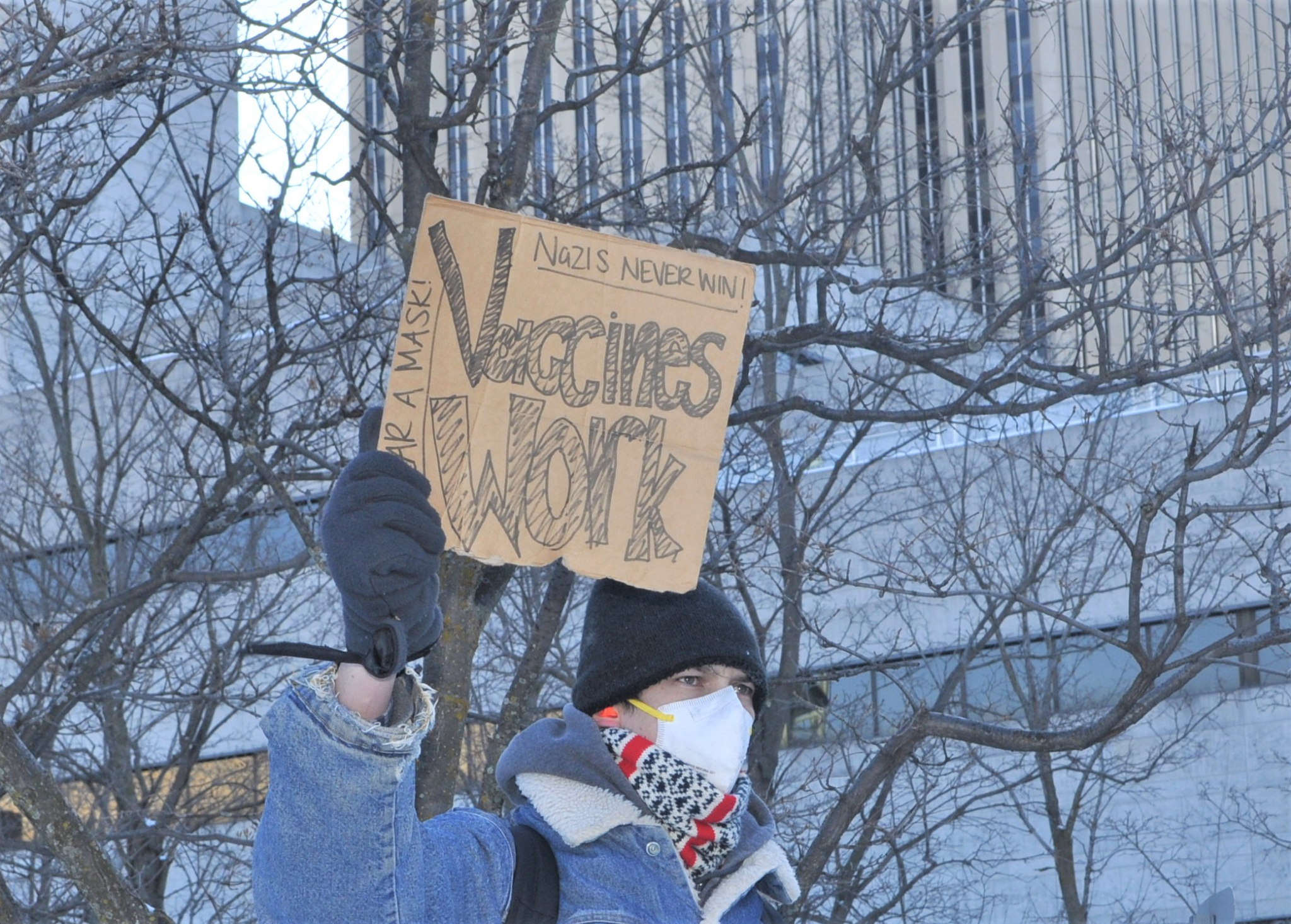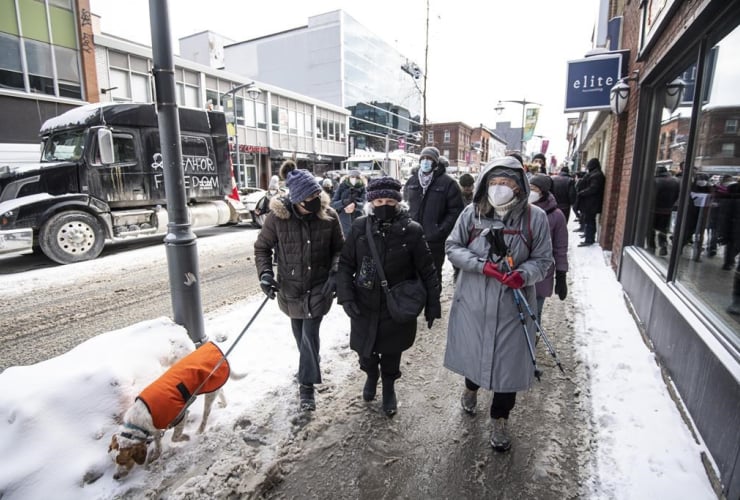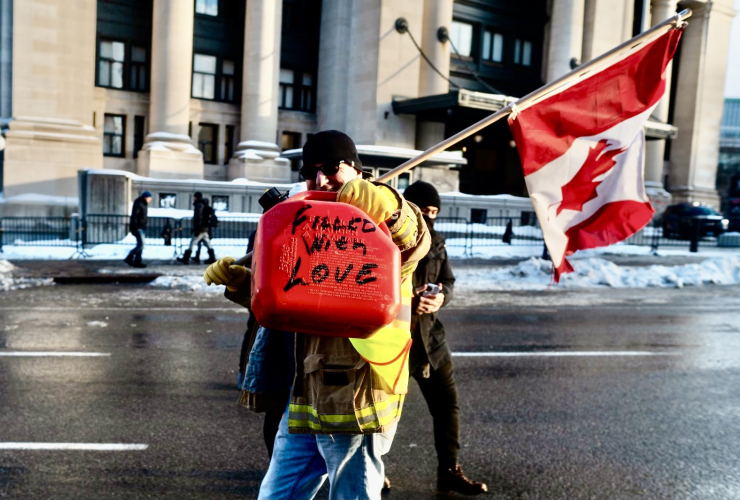Canadians are done with COVID-19. At least, that’s been the consistent message coming from Conservative premiers and politicians, who seem to be in some sort of race to see who can trigger a fifth wave of the virus first.
It has also been the go-to line for federal Conservatives looking to justify their support of the anti-democracy convoy in Ottawa, which seems poised to take an even more illiberal turn.
There’s just one problem: it’s a load of crap.
According to a new survey from Abacus Data, nearly two-thirds of Canadians support the continued existence of vaccine mandates “for at least the next year or two,” while that figure jumps to 74 per cent among those 60 and over. And when it comes to those most directly exposed to the occupation of our national capital, more than two-thirds of Ottawa residents believe restrictions should be kept in place to prevent the health-care system from getting overwhelmed.
But it’s that one-third of the population that seems to be driving the public discourse right now — and making policy in provinces like Alberta, Saskatchewan, and Ontario. On Monday, Doug Ford announced he’d be eliminating his province’s vaccine passport system as of March 1, making Ontario the latest province with a Conservative government to surrender to the demands of an increasingly vocal minority.
Earlier this month, after a group of rural protesters blockaded Alberta’s southern border and insisted the province lift all public health restrictions, Premier Jason Kenney capitulated to their demands and moved up the timetable on his “Back to Normal” plan. Not to be outdone, Saskatchewan Premier Scott Moe released a statement aimed at the people planning to blockade his province’s border that openly acknowledged he’d lifted COVID-19 health restrictions in their name.
The idea of going “back to normal” is understandably attractive to most people given that we’ve all endured more than two years of a pandemic. But while it’s not quite as nakedly reckless as Kenney’s “best summer ever” strategy of a year ago, it still represents an attempt to ignore the reality of a highly infectious virus — and the lessons we should have learned from it so far.
As Dr. Isaac Bogoch told Peter Mansbridge in a recent episode of his podcast, “You can’t just assume that this is the last wave or that all is well after this because there’s going to be more variants and more waves. This isn’t over.”
We might be done with the virus, in other words, but it’s not necessarily done with us.
The latest surge of cases in the United States, where the number of COVID deaths is rapidly approaching one million, speaks to that unpleasant reality. So, too, do the COVID-19 hospitalization figures in Alberta and Saskatchewan, which remain at or near record highs.
All the politically motivated wishful thinking in the world can’t change the basic realities of math and biology, and it can’t protect people from a virus that is still rampaging through the population.
Let’s be clear: When politicians like Kenney say we should “learn to live with” the virus, what they really mean is we should surrender to its inevitability. It’s the 21st-century equivalent of a British political leader advising Londoners to “learn to live” with the Blitz of 1940-41 by practising their German.
It’s cowardice, not strength. That’s been a running theme over the last two years, as Conservative politicians and pundits consistently undermine efforts to build social solidarity and stiffen our collective upper lip.
Rather than going “back to normal,” we need to find ways to create a new normal. We need a normal where we can trust police officers to enforce the law evenly and equitably. We need a normal where one-half of our political universe isn’t so eager to undermine institutions or embrace those who attack them. And we need a normal where the needs of the many take clear precedence over the demands of the few.
Because make no mistake: this isn’t our last pandemic.
The last two years have weakened the body politic and left us less prepared to handle future crises. They’ve made the prospect of taking decisive collective action even more unlikely than it was two years ago. And they’ve empowered individuals who seem determined to vandalize our shared social infrastructure and undermine public trust for personal or political profit.
We have a lot of work to do to repair that damage. We’d better get started on it as soon as possible.
(replying to Alex)
(replying to Alex)
Totally agree that the FPTP system needs to change to something better. Until it does a lot of us will almost always end up voting against the worst-case-scenario candidate, or not voting at all. I seem to recall that for at least the last couple of federal elections the did-not-vote folks outnumbered FPTP winners in all but one province - Alberta I think.
But I fear the opportunity for electoral reform has been lost for this generation. Though the Liberals even ran on it as part of Mr. Trudeau's first platform and so came to power with even a public mandate to do something about it, in the end electoral reform would have required putting the national interest ahead of political self-interest, in other words, real political courage, and we all saw what happened.
Without electoral reform we're stuck in this loop: try to push the Liberals to act on climate, or punish them by voting for someone (the NDP or the Greens) that say that they will act, thus dividing the progressive vote and allowing the worst-case-scenario party, that still doesn't readily admit that climate change is even real, to gain power with less than a third of the vote. The worst case scenario party then proceeds to shamelessly tilt Canada towards autocracy until we can once again unite behind another Liberal leader, who then spends nearly a decade in a (to say the least) a non-linear stagger forwards and backwards trying to restore Canada to a state that two-thirds of us are at least somewhat happier with, all the while buffeted by efforts of the worst-case scenario party whose primary mission appears to simply 'oppose', undermine and thwart at every opportunity for pure partisan advantage and it seems perhaps are willing to do anything and say anything, even going so far as to buoy anti-government insurrectionists, in order to win back power.
Hopefully the next Liberal leader will finally have the courage to follow in New Zealand's footsteps in striking a Royal Commission on Electoral Systems, having a national conversation and then with the public both engaged and informed, holding a referendum.
I'm hopeful that my children will live to see that, but discouraged that it will all arrive too late to meaningfully mitigate Canada's contributions to climate disaster.
- ‹ previous
- 2 of 2






Comments